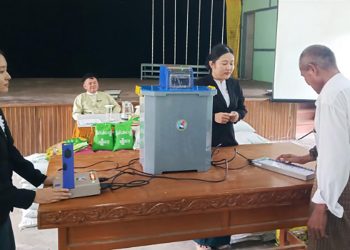YANGON — A recently proposed list of amendments to the Peaceful Assembly and Procession Law, better known as the protest law, has become the most controversial piece of legislation of the past two years.
Hundreds of people have marched against it, and more than 200 civil society groups issued a joint statement opposing the proposed changes. Critics have even launched an anti-amendment sticker campaign. Sixty of the military’s parliamentary appointees have signed up to debate the bill.
Opponents say the proposed changes would place further restrictions on the right to free assembly and expression and are so broadly defined that they could be exploited to stifle political dissent. The original protest law — enacted in 2011 under the previous military-backed government and amended in 2014 — has already been used to arrest and imprison activists.
The law was replaced in October 2016, after the National League for Democracy (NLD) came to power, so that protesters had only to notify authorities and no longer needed to secure their permission.
Some senior NLD officials, however, said easing the rules has provided an opportunity for those who want to incite unrest and destabilize the country.
Since the law was replaced, the country has seen a series of mass nationalist protests in some of its biggest cities, most of them religiously tinged and accusing the government of neglecting Buddhism in favor of Islam or criticizing the appointment of a special advisory commission for crisis-torn Rakhine State.
The protests have been a headache for a government already under intense international pressure over the crisis.
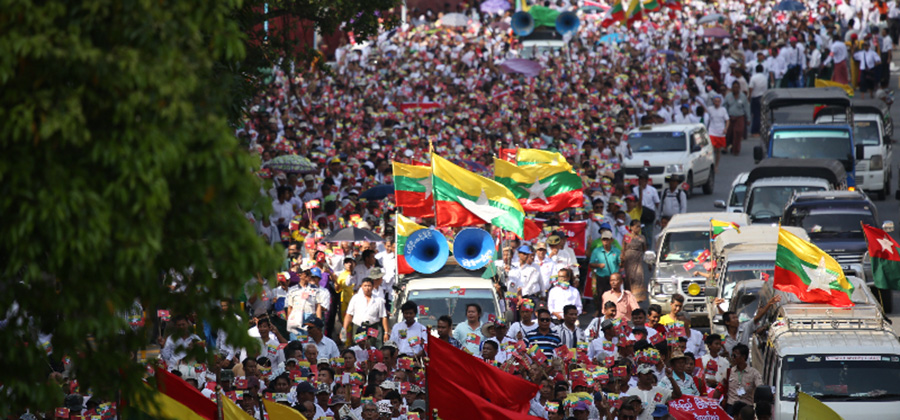
The most notable of the protests were the pro-army rallies that drew thousands of supporters of the military, or Tatmadaw, which the UN and US have accused of an ethnic cleansing campaign against Rohingya Muslims in northern Rakhine.
Some of the protests’ most active participants have turned out to be nationalist Buddhist monks, members of the military-backed Union Solidarity and Development Party (USDP), and followers of Ma Ba Tha — the most prominent group in the country spreading anti-Muslim sentiment, it was banned by the government last year.
Those who have organized and joined recent nationalist protests have said the events were paid for by fellow nationalists and sympathetic donors.
In May, Religious Affairs Minister U Aung Ko said a group or organization wanting to reverse the country’s transition to democracy — he did not specify who — was supporting the nationalists.
Monywa Aung Shin, secretary of the NLD’s central information committee, told The Irrawaddy that the growing number of nationalist protests since the protest law was replaced was one reason for the recently proposed amendments.
“Because we eased the restrictions, it became worse,” Monywa Aung Shin said.
He said the nationalists’ protests threaten the rule of law and need to be prevented.
Hoping to deter those with hidden motives from orchestrating protests from the shadows, the NLD proposed a set of amendments to the law on Feb. 19.
A Year of Nationalist Protests
May 20, 2017: About 300 nationalists and Buddhist monks, along with some 2,700 more supporters from across the country, marched to Naypyitaw to accuse U Aung Ko of neglecting Buddhism and favoring Islam.
They demanded that the minister apologize and that a number of nationalists convicted or accused of crimes see the charges against them dropped or that they be released from prison.
After the protest, U Aung Ko released a statement claiming participants were paid between 7,000 kyats to 30, 000 kyats ($5 to $22) and that 800 million kyats ($584,000) was spent on organizing the demonstration. He also claimed that an organization or group of people wanting to reverse the country’s transition to democracy was supporting the nationalists.
June 25, 2017: More than 200 Buddhist monks and laymen gathered in Mandalay and called for U Aung Ko’s resignation.
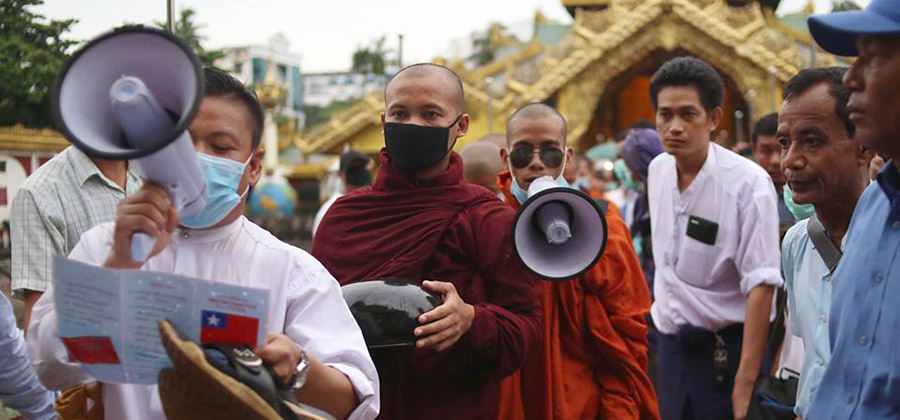
Aug. 2, 2017: Several dozen nationalist monks and laymen staged sit-ins at religious sites in Yangon, Mandalay and Taunggyi in Shan State calling for the government to step down because it had failed to protect Buddhism.
After the government broke up the protesters’ camp in Mandalay on Aug. 5, those in Yangon and Taunggyi shut down their own camps.
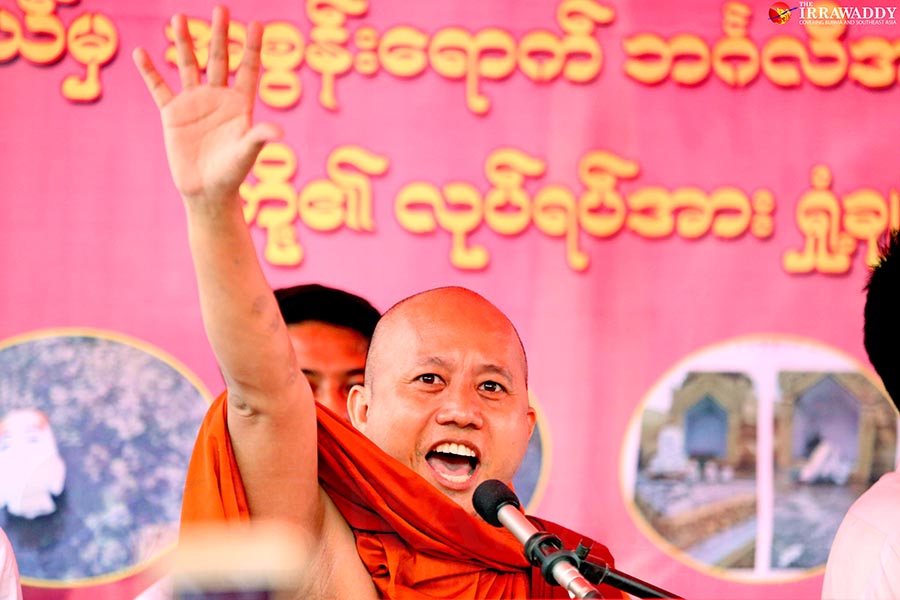
Aug. 30, 2017: Hundreds of nationalists held a demonstration near Yangon City Hall against the final recommendations of the government-appointed Rakhine State Advisory Commission and the recent attacks by the militant Arakan Rohingya Salvation Army (ARSA) in Rakhine on Aug. 25.
Ultranationalist monk U Wirathu joined the demonstrators, who called on the government to declare martial law in Rakhine and to convene a meeting of the military-dominated National Defense and Security Council (NDSC).
Sept. 18, 2017: Hundreds of nationalists protested again near Yangon City Hall against the commission’s recommendations, opposing its call for a review of the country’s Citizenship Act and an end to restrictions on Rohingya.
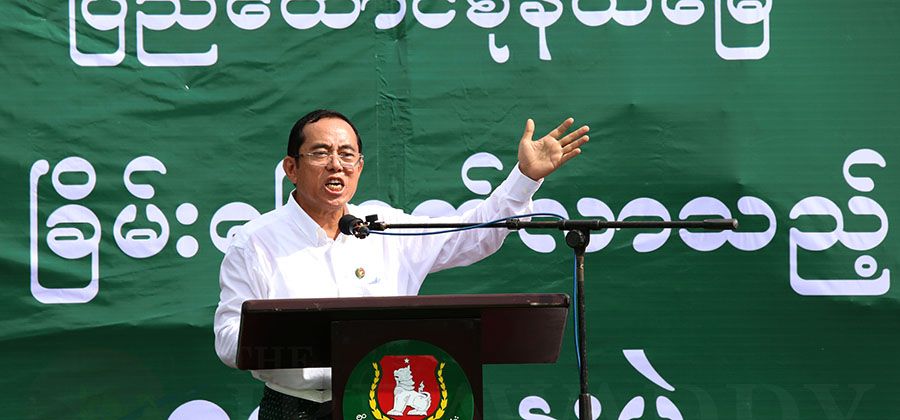
Sept. 21, 2017: The former ruling USDP staged a rally in Naypyitaw at which they warned that the conflict in Rakhine State could lead to “territorial loss” for Myanmar.
The USDP also rejected the government’s formation of the advisory commission and the recommendations the commission came up with. It also complained about the NLD government’s failure to call a meeting of the NDSC.
Sept. 26, 2017: About 3,000 nationalists in Mandalay and from surrounding areas joined a rally to condemn the ARSA attacks and protest against foreign interference in the internal affairs of the country, referring to the crisis in Rakhine State.
The protesters also rejected the advisory commission’s recommendations and any suggestion of amending the Citizenship Act.
Nov. 19, 2017: Thousands of people including Buddhist monks joined two mass rallies in Mandalay Region and Karen State held simultaneously by the “Tatmadaw Admirer Group” to show support for the army’s actions in Rakhine Sate. Similar pro-army rallies were held in September and October in Mon State and Yangon, respectively, that attracted thousands of people including USDP members, nationalist monks and their followers.
Feb. 2, 2018: Nationalists appeared at a Yangon court hearing for the accused murderer of Muslim lawyer U Ko Ni wearing T-shirts reading “Eat Well” to show their support for the co-conspirators on trial. The phrase in Burmese is considered a threat to show one’s anger and to warn of impending revenge, advising the target to have a final, hearty meal before death.
Prevention or Restriction?
The recently proposed amendments would require would-be demonstrators to identify their funding sources and stipulate jail time for using protests to instigate unrest.
Rights groups say the changes prioritize control over the right to protest.
NLD lawmaker Naw Susana Hla Hla Soe said terms in the proposed amendments are too broadly and give authorities lots of leeway to define them, citing the proposed Article 18 as an example.
The article would stipulate prison sentences of up to two years for provoking or exhorting others to organize or participate in demonstrations by bribing or paying them money or doing anything else with the intention of harming the stability, rule of law, peace and tranquility of the community and public morality.
But senior NLD officials and other supporters of the bill say the changes would impose no new restrictions on peaceful protesters.
“Some people are saying they will be charged under the amendments if they give just a water bottle to a protester or if they clap and cheer. It is not so. It depends on the intention [of the supporter] and the amount [of the support],” NLD lawmaker U Myat Nyana Soe, who supports the bill, told The Irrawaddy.
Despite strong opposition, the bill was passed by the Upper House earlier this month — the majority of votes came from the NLD — and forwarded to the Lower House, though the maximum prison time for violating Article 18 was dropped from three years to two.
“We proposed the amendments to target the dark elements behind [the protests]” U Myat Nyana Soe said.
Human rights activist U Aung Myo Min said it was clear that the NLD wants to amend the law in order to take action against those who mastermind demonstrations that might cause instability or create a crisis for the government.
Still, he said, the law should not be changed with the intention of preventing groups from taking to the streets, adding that free expression and peaceful assembly were fundamental human rights.
But opposition to the bill is not only coming from democratic forces.
The USDP, which used the protest law to arrest activists while in power, and the military, which has a long history of human rights abuses and of cracking down on peaceful protesters, are opposed to the changes too.
During a discussion of the amendments in the Upper House Bill Committee, Brigadier General Tint Lwin argued against them.
“Whichever organization funds the protest, the citizens’ right to peaceful assembly is more essential,” Major Aung Ko Min, a military appointee to the Upper House, said the day the chamber voted on the bill. He said the proposed amendments would hinder those who want to pay for a protest honestly.
Lieutenant Colonel Tin Lin Oo spoke out against Article 18 as well.
“The military [appointees] are now repeating the words that the NLD and pro-democracy activists once used,” said U Pe Than, a Lower House lawmaker for the Arakan National Party. “I think they want to show the public that they guard the Constitution and stand together with the people.”
Rights activist U Aung Myo Min said the military’s words may sound similar but had different motives.
“We stand for human rights. Even if they speak the same words, the intention is different because we don’t have any political motives,” he said.

















